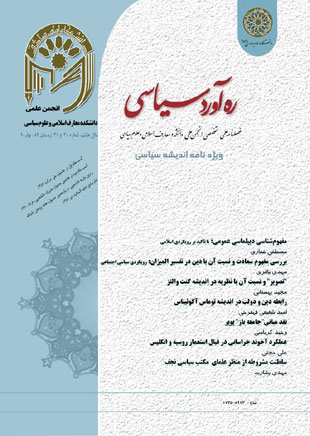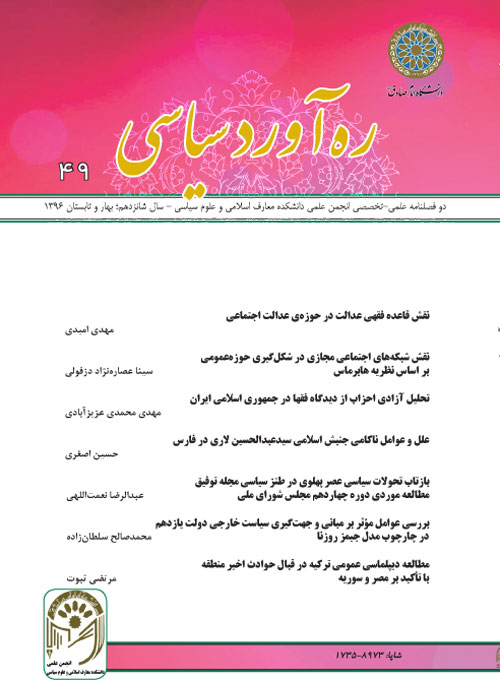فهرست مطالب

نشریه ره آورد سیاسی
پیاپی 30-31 (زمستان 1389 و بهار 1390)
- ویژه نامه اندیشه سیاسی
- تاریخ انتشار: 1390/04/04
- تعداد عناوین: 8
-
صفحه 1
-
صفحه 113
-
Page 3Public Diplomacy is a concept used for referring to some aspects of foreign relations and diplomatic behaviors of states, after collapsing of Soviet Union and in the globalizing world. In this kind of diplomacy, states in diplomatic relations, tends to target on peoples of other nations instead foreign officials & counterparts; in that by coinciding public opinion of aim countries with their own security &national interests, facilitate reaching to their own goals of foreign policy. In this material, author seeks to review the history andquality of building the concept as well as elaborates the concept in Islamic viewpoint and compares it with western one.
-
Page 31The concept of salvation is one of the main themes in understanding the political thought, particularly in Islamic scholars’ thought. Divine religions & specially Islam as latest and most comprehensive one pay a great attention to the concept. According toAllameh Tababtabai’s opinion human society to achieve salvation must commit to principles of human nature and Godly system of creation. In other words believing in Godly system of creation is faithfulness (Iman) and acting according to that is righteous action (Amale Saleh). Furthermore, religion carried by God is an expansion of human nature which we find in our self (Fetrat). So, religion _Islam _is the scale of faithfulness and righteous action. Hence salvation of a society in both worlds requires rule of such religion.
-
Page 59Up to 1960s Behaviorism dominated epistemologically the academic spheres of social sciences including International Relations. It held, given the discoverable a prior order in reality, scientist was able to find out "outside" objectively, by withdrawing the subjectivity.Waltz was the first who applied systemic approach to International Relations. Moreover, tended to the recent attitudes of Philosophy of science, the separate of subject and object is idiotic for him. So, in addition to alternate "level of analysis" with "image", to show coinfluence of subject and object to each other’s, he introduced systemicapproach to "three images" as the best to explain world politics. In this article, first, these issues would be presented: what is "level-ofanalysis"(image), its place and its application in Waltz's theory? Then, it is going to be explained why waltz was inclined to replace "level-ofanalysis" with "image"?
-
Page 89Governors’ scope of authority in sacred &secular affaires, and also extent of influence &effect of religion & clergymen in political affairs, has been regarded as one the significant issues through history of political practice and thought, which has led to separation or proximity and mixture of religion and politics in both theory & practice. This article seeks through studying Thomas Aquina's thoughts, as the greatest philosopher and theologian of catholic Christianity and one of the greatest claimant of composing philosophy and religion, the answer of how did he find the relationship between religious and political affairs, and how & how much his opinions is used in modern thoughts, Therefore, afterstudying the bases of his thought, which were effective in his political opinions, the relationship between religion and state in regard to his Christy-Aristotelian principles and then these relations in regard to his theories on law is assessed.
-
Page 113Karl Popper is one of famous advocate of liberal democracy. He, in the book) Open society & its enemies), after expressing some critiques of Plato, Hegel and Marx, paves the way for scheming of idea of "Open Society". This article seeks initially toexplain the foundations of "Open Society" and then to criticize them; so the main question of the search is "are Karl popper’s bases and reasons given for criticizing Close Society and defending Open Society correct? If not, what are criticisms of them? The method used to answer to the question is descriptive-analytic one. The materialseeks to express defects of falsification as well as presents another method for gaining knowledge. Falsification is base of piecemeal engineering and piecemeal engineering is axis and cornerstone of Open Society. So in regard to review the bases of Open Society, thedefects will be criticized and the possibility of overall engineering of society will be explained. Finally the quality of gathering the overall engineering and the piecemeal engineering and authorized area of each other will be clarified.
-
Page 131Securing Islamic survival is one the most important issues in the Shia jurisprudence which is regarded as one of permanent concerns for Shia clerics. Russian and Britishinvasion to Iranian territory in the late of nineteenth century jeopardized Islamic community. Akhond khorasany as the most well-known Shia clerics in that time did his ability at the best to expel the invaders.
-
Page 153The Political school of Najaf is result of part of political& social developments of the Shia world. The school was established during Constitutionalism movement by Akhond Khorasani at holy Najaf city in 1936. The school in the early history of its foundation organized a group of some famous clergymen whom produced direct effect on lion share of Shia political thoughts & movements in recent century. The constitutional state is one of the principles emphasized by the school. The paper presents a survey on some of the clergymen’s thought (like Akhond Khorasani, Mirzay Naenee, Seyed Hasan Modares, Seyed Abolghasem Kashani) about the constitutional state, its necessity and assesses its legitimacy on Shia political thought.


